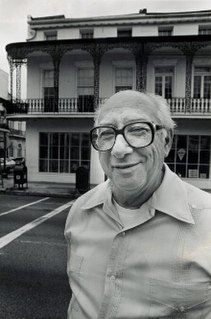A Quote by Cosimo Matassa
If anybody had a sense of history, it wasn't me, I'll tell you that. I, I was just enjoying life and, and making a living and, and, you know, listening to all this good music. No, there was never in my mind any kind of sense of history, nothing.
Related Quotes
I wasn't thinking about history. I was thinking about how we were going to end segregation at lunch counters in Atlanta, Georgia.We would have never thought about making history, we just thought: Here is our chance to get out our sense of rejection at this kind of racial discrimination. I don't know that there was a time that anybody growing up in the South wasn't enraged about being segregated and being discriminated against.
There is a palpable sense of history in the homes that I choose to occupy. I think that's one of the reasons I gravitate towards old homes: I really like that sense of history and that sense that I am one step in a very long process that trails out in both directions around me - before me and ahead of me.
'London' is a gallery of sensation of impressions. It is a history of London in a thematic rather than a chronological sense with chapters of the history of smells, the history of silence, and the history of light. I have described the book as a labyrinth, and in that sense in complements my description of London itself.
London' is a gallery of sensation of impressions. It is a history of London in a thematic rather than a chronological sense with chapters of the history of smells, the history of silence, and the history of light. I have described the book as a labyrinth, and in that sense in complements my description of London itself.
Muslims naturally saw Christendom as their arch rival. One point that is really important to bear in mind, particularly in addressing an American audience, and that is that the Islamic world has a very strong sense of history. In the Muslim world, history is important and their knowledge of history is not always accurate but is very detailed. There is a strong historical sense in the Muslim world, a feeling for the history of Islam from the time of the Prophet until the present day.
There's a lot we should be able to learn from history. And yet history proves that we never do. In fact, the main lesson of history is that we never learn the lessons of history. This makes us look so stupid that few people care to read it. They'd rather not be reminded. Any good history book is mainly just a long list of mistakes, complete with names and dates. It's very embarrassing.
It is not surprising that only one medieval state, Venice, long possessed anything clearly identifiavble as a navy in this sense. We shall see that no state in the British Isles attained attained this level of sophistication before the 16th century, and no history of the Royal Navy, in any exact sense of the words, could legitimately begin much before then. This book, which does, is not an institutional history of the Royal Navy, but a history of naval warfare as an aspect of national history. All and any methods of fighting at sea, or using the sea for warlike purposes, are its concern.



































